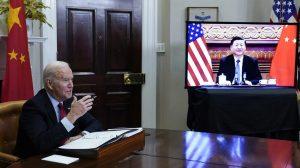
Chip supplier says China will struggle to develop advanced technology
Japanese semiconductor materials maker JSR warns that Beijing lacks the infrastructure to catch up
The chief executive of JSR, one of the world’s largest suppliers of materials critical to semiconductor manufacturing, said the lack of industrial infrastructure will make it “very difficult” for China to develop advanced chip technologies despite its desire to be self-sufficient. .
Eric Johnson, a rare U.S. leader of a Japanese semiconductor company, also said in an interview that he believes supply problems in the chip sector will persist into 2023.
Limiting U.S. exports of the technology needed to produce the most advanced chips has prompted China to invest heavily in developing its own semiconductor supply chain.
But Johnson said it would be difficult for China to master the sophisticated chip-making technology based on a method known as extreme ultraviolet or EUV lithography.
“I think China would also like to develop its own EUV competency, its own ecosystem for these things. Frankly, I think it would be very difficult for them to do that,” Johnson said.
The semiconductors needed for products from smartphones to washing machines have become a point of competition between Washington and Beijing. Joe Biden began his first trip to Asia as U.S. president Friday, visiting a Samsung chip factory in South Korea and stressing his desire to secure the semiconductor supply chain.
EUV lithography is a very complex process that uses light to etch tiny integrated circuits onto silicon wafers.
Even if China “gets a document of what the chemistry is … . to produce it with purity, precision and reproducibility is really difficult,” Johnson said. “It’s not that easy, and they also don’t have the supply chain to support it.”
Tokyo-based JSR is a leading supplier of photoresists, thin layers of material used to transfer circuit patterns onto semiconductor wafers. Analysts say JSR accounts for about 30 to 40 percent of the global market for photoresists used to make advanced chips, and its customers include Samsung, Taiwan’s TSMC and Intel of the United States.
China is the world’s largest chip importer and is investing heavily in semiconductor initiatives as part of its “Made in China 2025” initiative, which aims to achieve 70 percent self-sufficiency in the most critical components for critical technologies by 2025.
But Johnson said that “advanced capabilities take decades and a lot of money to develop . . you really need apps like the iPhone to pay for things.”
Still, Johnson stressed that Beijing is aggressively investing in less advanced chip technologies, which are also important, and that China is an important part of JSR’s growth strategy.
He said he wants to balance the ability to “respectfully” and “responsibly” serve customers in China with “sensitivity to concerns the U.S. government has and concern for protecting interests in Japan.”
“It’s underestimated how many opportunities there are in China that don’t depend on these very advanced capabilities,” he said.
Johnson said the global chip supply problems that have crippled the global economy will be fixed by next year.
“It just takes time to get the new capacity up and running, and that new capacity won’t begin to have a significant impact until probably the end of this year or next year,” Johnson said.
He said he expects the sector will be particularly “challenged” to meet demand for semiconductors for cars because they use less advanced chips that are less profitable and attract less investment.

